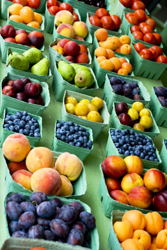Conceptualising sustainable food supply chains
Food quality and sustainable rural development are increasingly prevalent issues regarding the future of food and farming in Europe. In light of this, the SUS-CHAIN project undertook the reconstruction of 14 vastly diverse food supply initiatives in seven European countries. In the course of this analysis, it became evident that the distinctiveness of the initiatives is founded on three dimensions. These are governance, embedding and marketing. Governance relates to the structural and process-related aspects of a food network. Embedding involves the degree that a food network employs local resources as well as how societal norms and values factor into the food product and chain. Marketing refers to the business management of an enterprise or alliance. These three dimensions are interrelated and interconnected and thus keeping them continuously coordinated and balanced is crucial in regards to scaling up a food supply chain. The 14 cases exemplify their unique individual paths while simultaneously highlighting similarities and differences. Through a detailed comparison of these similarities and differences, three main paths have been distinguished. These include chain innovation, chain differentiation and territorial embedding. Chain innovation involves the creation of a new food supply chain focusing on design development and implementation. Chain differentiation refers to the production and marketing of more distinct products having a significant difference to those already available in the existing chain. Territorial embedding is reconstructing a food supply chain to propel regional development and is driven by public or societal concerns regarding sustainable regional development. Policy involves making choices that necessitate provision of effective support in all its forms including financial, marketing, information and public relations, advocacy, training and consulting, etc. The key issue therefore is how to go about providing the most effective and efficient support to meet the prevailing needs. The GEM framework offers increased awareness of development opportunities, constraints and risks encountered by different food supply chains in their various stages of development. In this way, particular types of paths having specific requirements can be assisted in improving their sustainability performance and thus in meeting their full potential.







